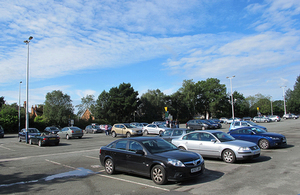
- world-leading project sees new data standards introduced which could revolutionise parking, improving the driver experience
- data could identify available parking spaces, permitted times and price, in simple formats that apps can use right across the country
- could mean the end of outdated parking systems, encouraging more shoppers onto Britain's high streets
The age of the payment parking machine could be coming to an end, as new national parking data standards were revealed today (30 May 2019). By introducing the new standards, the government's ambition is for all parking data released by local councils and companies across the country to use the same language, supporting the development of apps to make parking easier for drivers.
Created by the Alliance for Parking Data Standards (APDS) and funded by the Department for Transport, the standardised data could lead to smoother and easier payment methods right across the country and could transform the way we park as the Oyster card transformed the way we travel in London.
The announcement follows the publication of the government's Future of mobility: urban strategy, and is a world-first for parking. By helping to streamline the parking experience and making it easier for drivers to find a suitable parking place, the standards could ultimately free up crucial space, easing congested cities and boosting British high streets.
Future of Mobility Minister, Michael Ellis, said:
We are on the brink of a revolution for the future of transport, with ground-breaking technologies creating huge opportunities for cleaner, cheaper, safer and more reliable journeys.
We now need to ensure the infrastructure surrounding these technologies is in place and can accommodate these innovations. The new parking data standards will bring government, private organisations and technologies together to ensure a smoother parking experience for drivers.
Chair of the British Parking Association and Chair of the APDS, Nigel Williams, said:
The new standards will enable the next generation of apps and connected cars to find a parking space, park and pay - with little or no intervention from the driver. The involvement of the British Parking Association in APDS has ensured that the UK is at the forefront of innovation to improve the customer experience of parking.
Local Government Minister Rishi Sunak said:
Hunting for a parking space and then checking if you have the right change to pay for it isn't the best start to any shopping experience, but it can be the reality more often than not.
An intelligent parking system will not only make life easier for commuters, but could also improve footfall to our town centres - meaning both people and local businesses benefit.
To support the introduction of the standards, 4 research and development projects in Manchester City Council, Oxfordshire County Council, Cambridgeshire County Council and across a consortium of South Essex Councils will receive a share of £1 million to start putting the APDS standards into practice, with a further 7 projects being commissioned to identify ways to open up local authority data.
The development of the parking language will make it easier for local authorities and private companies to exchange data, ensuring cars of the future navigate both driver and passengers to an available space based on the price, quality of the space, safety of the space and availability of on-site services - including being near to electric chargepoints.
The announcement is another milestone for the government's Future of Mobility Grand Challenge, which aims to tap into the extraordinary innovation across the country in order to improve everyday journeys.






